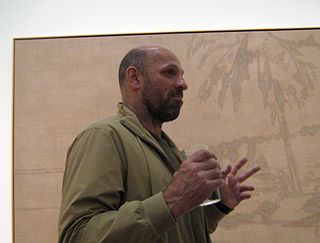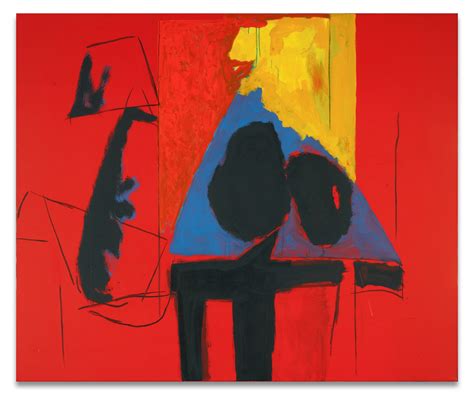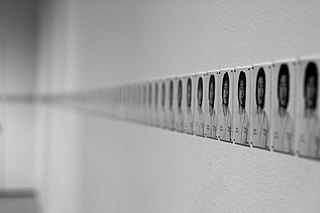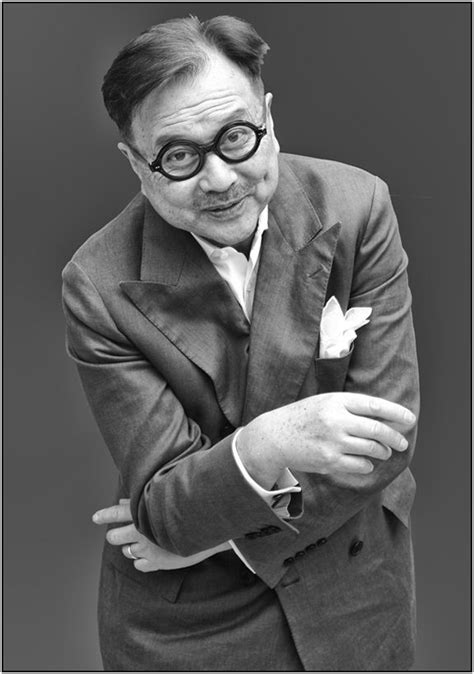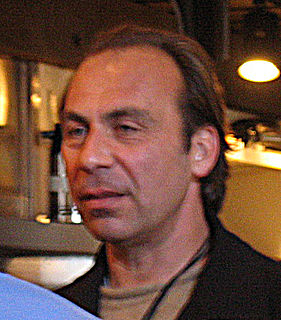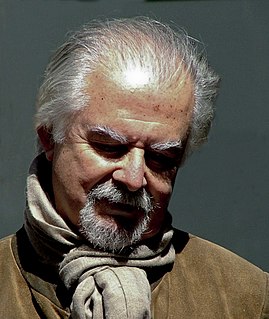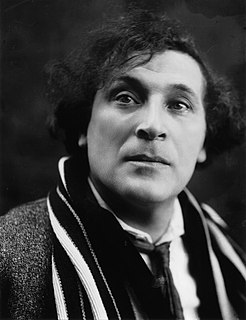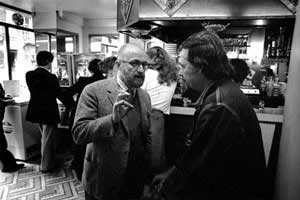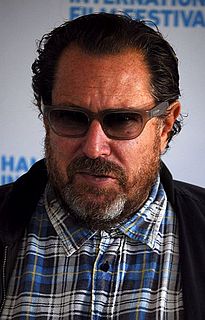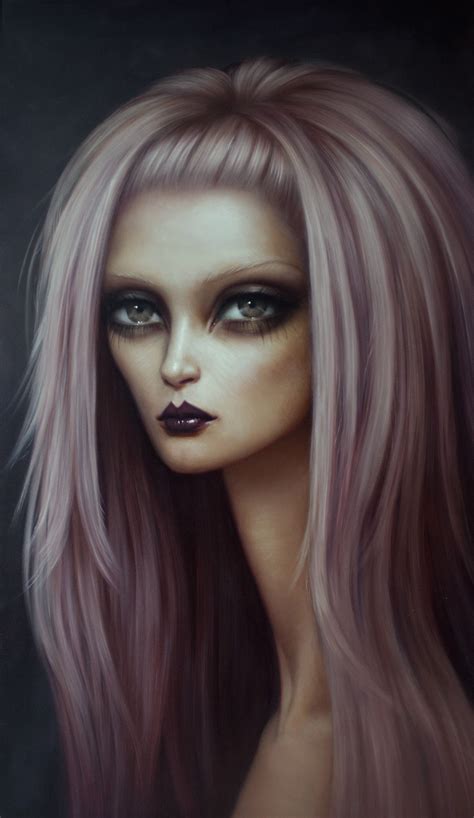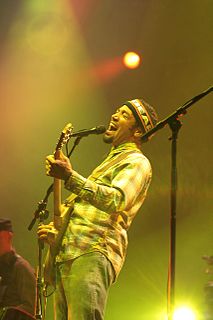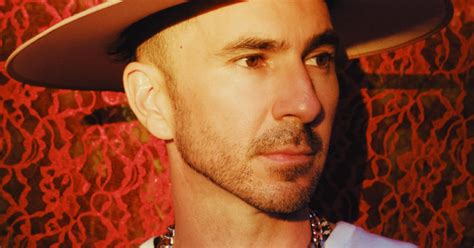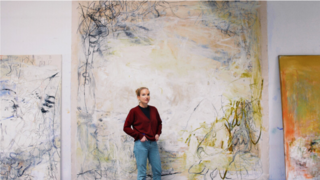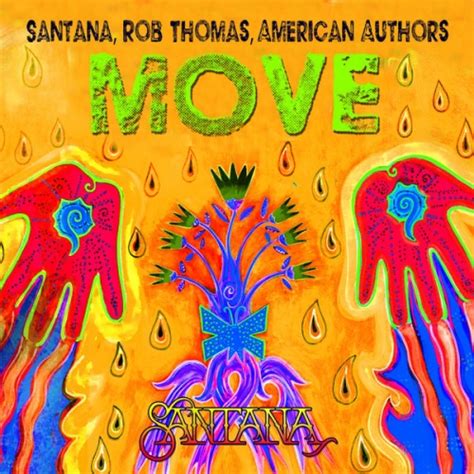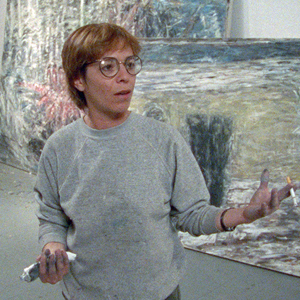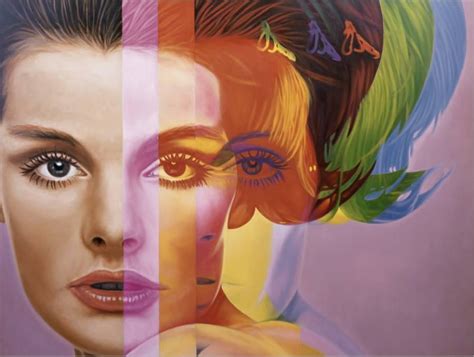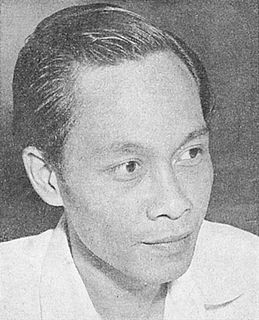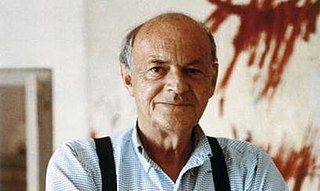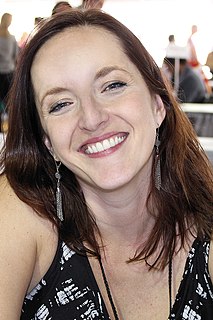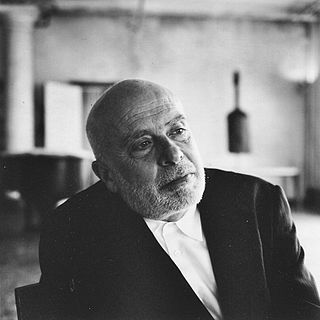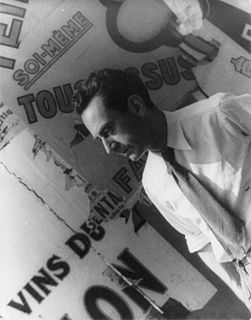Top 1200 Abstract Painting Quotes & Sayings - Page 8
Explore popular Abstract Painting quotes.
Last updated on December 19, 2024.
Writing plays supplied for me everything that painting didn't, which is the ability to tell stories in real time, in a real space, in three dimensions, in flesh and blood. I realized I had been trying to cram all this narrative into my paintings, but ultimately painting was a static medium. So it just opened up this whole new door.
In printmaking, I essentially use the same process as in painting with one important exception ... to try, with sensitivity to the medium to emphasize what printing can do best ... better than say, painting or collaging or watercolour or drawing or whatever ... Otherwise, the artist expresses the same vision in graphics that he does in his other work.
Stained glass is unique from the outside, but as a painting insider, I know that oil painting's all about light. And it's about the depiction of light, the way that it bounces off different types of skin, different landscapes. The mastery of that light is the obsession of most of my painter friends.
For centuries, we in the West have thought of ourselves as rational animals whose mental capacities transcend our bodily nature. In this traditional view our minds are abstract, logical, unemotionally rational, consciously accessible, and, above all, able to directly fit and represent the world. Language has a special place in thie view of what a human is - it is a privileged, logical symbol system internal to our minds that transparently expresses abstract concepts that are defined in terms of the external world itself.
You are confronted with abysses of time that are, in a way, unfathomable. You see a painting in charcoal of raindeer and it was left unfinished and somebody else finished it. But through radio carbon dating we know that the next one completed the painting 5,000 years later. You're just blown away by the notion of passage of time. We have no relationship to that kind of depth of time.
I come from a painting background, and although my painting is completely different from my performances, there is something about the fundamentals of that training that transfers over to this idea of an exercise and being diligent about mapping something out in advance - even if it is just being aesthetically diligent.
The true essence of Chinese culture is sophistication, refinement, the spirit of poetry. The spirit of ink painting and calligraphy lives on forever. Calligraphy is more important than painting. Chinese always consider nature. Man is a very small part of nature. That's why in Chinese painting you see huge mountains and man very small, very humble before nature. You must be harmonious and one with nature. You don't fight it. And then there's a bit of a poetry. Of course, it's very complicated, but also very simple.
I never noticed competing with other generations. There's competition within your own generation, but that competition is good. Maybe you're annoyed that somebody's getting more money than you are, but what's really annoying is if someone's painting a better painting than you're making. So it's something to think about and work toward and stay focused on.
Most people don't really like to pose. It is difficult to get them to be present and relaxed under this kind of molecular scrutiny. I want them to understand I'm not simply painting them: I am painting them within a precise moment in time, as a shadow moves across their eyebrows. Then it is gone. The moment is over.
I have seen Colonial churches since I was very small, Colonial painting and polychrome sculpture. And that was all I saw. There was not a single modern painting in any museum, not a Picasso, not a Braque, not a Chagall. The museums had Colombian painters from the eighteenth century and, of course, I saw Pre-Columbian art. That was my exposure.
...if photos can reproduce the world more perfectly than any painter, can capture an instant, a look, a gesture, then what makes a painting good anymore? Painting subverts this subversion of its traditional nature by redefining itself - art is idea, not simply skillful execution. So, a work can be crudely made, or even machine made - but it has to be practically and functionally useless.
A lot of what I do is about being in the moment and I think that's hard for people to get. I like it when things suddenly affect the painting. I mix up this red and it affects the whole painting or this little bit of white falls down there, and something changes the whole nature of the thing. The residue on what happens, that's what's in the paintings.
Painting has always been a means of self-expression for me. Therefore, I paint because I have to and need to, not necessarily because I want to. Subconsciously or not, the figures I paint are a reflection of myself and whatever mood I am in at the time, so every painting is in essence a self-portrait.
I have always been a fan of Salvador Dali, but Amrita Sher-Gil, who was an Indian-Hungarian painter, is another favourite. She was painting Indian women, and, growing up here, I'd never seen anyone paint Indian women, so that was really incredible to see a painting of someone who looks like you. I think that has a lot of impact on you.
Remember always, in painting as in eloquence, the greater your strength, the quieter will be your manner, and the fewer your words; and in painting, as in all the arts and acts of life the secret of high success will be found, not in a fretful and various excellence, but in a quiet singleness of justly chosen aim.
The question I ask myself when adapting a book is how do I be true to the spirit and soul of the character? How would I describe this character in my medium? If you asked one person to do a painting of something and another to create a sculpture of it, you'll never ask, 'Why doesn't the painting look like the sculpture?'
The rejection of all abstract formalism. Materialism reminds every science of its real source: the world men transform. No science can, whether in its history or its object, grasp its own origins within itself or constitute itself as a closed world, exhaustively defined by internal rules. Materialism refers every science and every activity to the reality they depend on, even if this dependence is masked by a great many abstract mediations: mathematics as well as logic, aesthetics as well as ethics and politics.
There was a belief after World War I that painting could be an act of civil revolt. I want this exhibition, 'New Museum,' to be an act of civil disobedience. It's not so much about the New Museum on the Bowery, but the idea of challenging museums as projections of cultural authority. It's painting as insurgency.
Why was the painting made? What ideas of the artist can we sense? Can the personality and sensitivity of the artist be felt when studying the work? What is the artist telling us about his or her feelings about the subject? What response do I get from the message of the artist? Do I know the artist better because of the painting?
The painting was framed in a misty view of sky, sea, and valley. Newt's painting was small, black, and warty. It consisted of scratches made in a black, gummy impasto. The scratches formed a sort of spider's web, and I wondered if they might not be the sticky nets of human futility hung up on a moonless night to dry.
While it may seem a little mundane, the material realities of realizing the painting actually have a lot to do with how you should read the painting. For example, we assume that what the model is wearing is what we found him in in the streets. No; in fact, a lot of what happens is that in Photoshop certain aspects are being heightened or diminished. There is no actual material truth in these paintings.
I sit for two or three hours and then in 15 minutes I can do a painting, but that's part of it. You have to get ready and decide to jump up and do it; you build yourself up psychologically, and so painting has no time for brush. Brush is boring, you give it and all of a sudden it's dry, you have to go. Before you cut the thought, you know?
Painting is my profession, because it has always been the thing that interested me most. I'm of a certain age, I come from a different tradition and, in any case, I can't do anything else. I'm still very sure that painting is one of the most basic human capacities, like dancing and singing, that make sense, that stay with us, as something human.
Writing a short story is like painting a picture on the head of a pin. And just getting everything to fit is - sometimes seems impossible. Writing a novel, though, is - has its own challenges of scope. And I think of that as painting a mural, where the challenge is that if you are close enough to work on it, you're too close to see the whole thing.
Stealing, of course, is a crime, and a very impolite thing to do. But like most impolite things, it is excusable under certain circumstances. Stealing is not excusable if, for instance, you are in a museum and you decide that a certain painting would look better in your house, and you simply grab the painting and take it there. But if you were very, very hungry, and you had no way of obtaining money, it would be excusable to grab the painting, take it to your house, and eat it.
All my life I have painted pictures so that certain people would drop dead when they looked at them, but I have not succeeded yet. The worst painting cant hurt you, but a bad driver can kill you, a bad judge can send you to the chair, a bad politician can ruin an entire country, That is why even a bad painting is sacred.
The most difficult thing about painting is the self-discipline. When I finish a job, I give myself a few days, but then I have to discipline myself quite fiercely if I want to do some painting that's worthwhile. Otherwise, you're just doodling. It's much easier when you're just told what you have to do.
Global inequality is such an abstract concept, simply because there is no global government. Telling people in rich countries who have had no increase in real incomes, stagnant median wages and so on, that on the other hand global inequality is going down because people who are much poorer than them are getting richer - it's something that maybe they would like in an abstract sense, because everyone is happy there are fewer poor Chinese, but you may not be as happy if these Chinese are taking your job.




